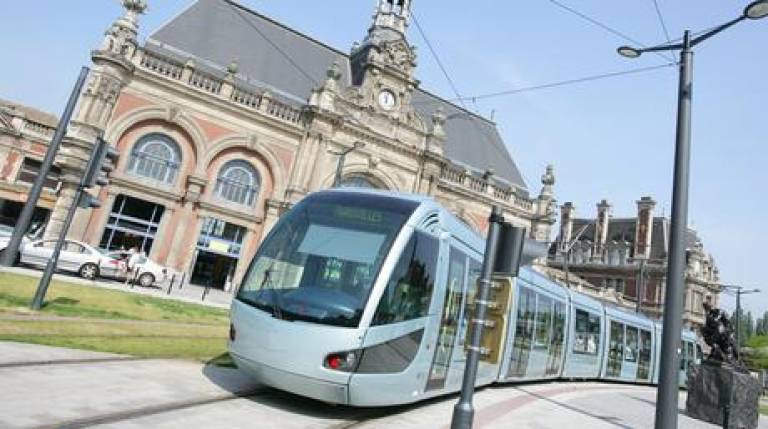Sintropher Conference in Brussels - Regeneration and Transport Networks
11 May 2014

The conference at the Crowne Plaza hotel attracted a large number of delegates and speakers from across Europe and further afield. Presentations covered new technologies, decision-making and governance and especially the economic and funding aspects of delivering projects. Speakers included Prof Sir Peter Hall, Bridget Rosewell from Volterra, Stephen Perkins, Head of Transport Research at the OECD, and Ümit Güney representing a flourishing tramway which has revitalised the city of Eskişehir in Turkey.
The Sintropher project has identified key issues of central importance in demonstrating the effect and impacts of better regional transport connections, and in creating the innovative, cost-effective ways in which they can be successfully designed and delivered. Our insights gained helped to inform the conference programme, but the issues reach far beyond the project remit, as does the geographical context for supporting regional growth.
Our aim for the day was to develop these wider issues, and to create a starting point for continued analysis. We have included a manifesto (below) and invite comments and feedback, tweeted or emailed. An updated manifesto will be circulated following the conference for your attention.
Further details, including all presentations and audio and video of the day are available on the conference website.
Contact us
Email: charles.king@ucl.ac.uk
NOTES: Sintropher is a transnational EU cooperation project. Its aim is to enhance local and regional transport provision to, from and within five peripheral regions in North-West Europe. Lasting five years and due to finish in 2014 it is funded by the INTERREG IVB Programme for North-West Europe.
The focus of Sintropher is to assess and promote development and accessibility of new or improved tram-based services linked to national rail systems in areas disadvantaged by their geographical location. The emphasis is on sustainable, cost-effective solutions by applying innovative transport technologies.
The Sintropher project held a very successful conference in Brussels on the 27th February 2014. The theme of this major European event was ‘Supporting Growth through Regional Connectivity’ – how can better transport links promote economic development at the regional level?
MANIFESTO
This conference, organised by the Sintropher Project, aims to inspire thinking, policy development and practical implementation in the vital area of transport and connectivity. The particular question is how to use transport to support urban and regional growth in North West Europe and the wider EU.
We want to encourage new thinking and action. The below sets out why we believe the event was significant and next steps. We invite old and new partners to contribute to this further agenda.
1. Our focus has been on rail-based transport – tram and train – using cost-effective solutions which make best use of existing infrastructure. To do this we have explored innovative technologies such as tram-train, and we have seen the range of possible solutions, and how they are supplied, constantly grow. All of the options help serve better connected, better integrated mobility.
2. A central part of our work has been to assess appraisal procedures and business case development processes. These vary hugely across EU countries, with different administrations having different priorities.
3. There is no single organisational or decision-making model, but a portfolio of ‘best practice’ is emerging and needs to be shared. We have gained a wide understanding of the present state of knowledge and the different ways in which Member States and regions view transport and its role in wider policy.
4. It is widely accepted that transport is having an increasing impact on regional and urban economic growth. The interaction is wider than access and linkage. Transport is no longer simply a way of getting from A to B; it is central to a place’s vitality, and connectivity can promote growth in itself. Also, the experience of the transport system, and its character and quality, can contribute to image and dynamism, and attractiveness for investment.
5. Now we have built this knowledge, we are determined not to waste it! We have identified gaps in both understanding, and dissemination of what works and what doesn’t. There are people who want to engage with this, and take it further in their role as professionals and leaders. Many are here today for this conference – cities, transport agencies, regions, professional organisations, local authorities, businesses.
6. We seek to build on this gathering of expertise and enthusiasm and link it to work being undertaken by other groups and organisations. We plan to codify what we have jointly explored and make it available. We see as important areas of continuing work:
· Further test and demonstration cases
· Research and best practice
· Networking and co-operation with other organisations
· Provision of a focus for new connections and new ideas
We see this as a shared journey so welcome partners with an interest in this area.
If you would like to be part of this continuing dialogue, please get in touch with Charles King.
 Close
Close

